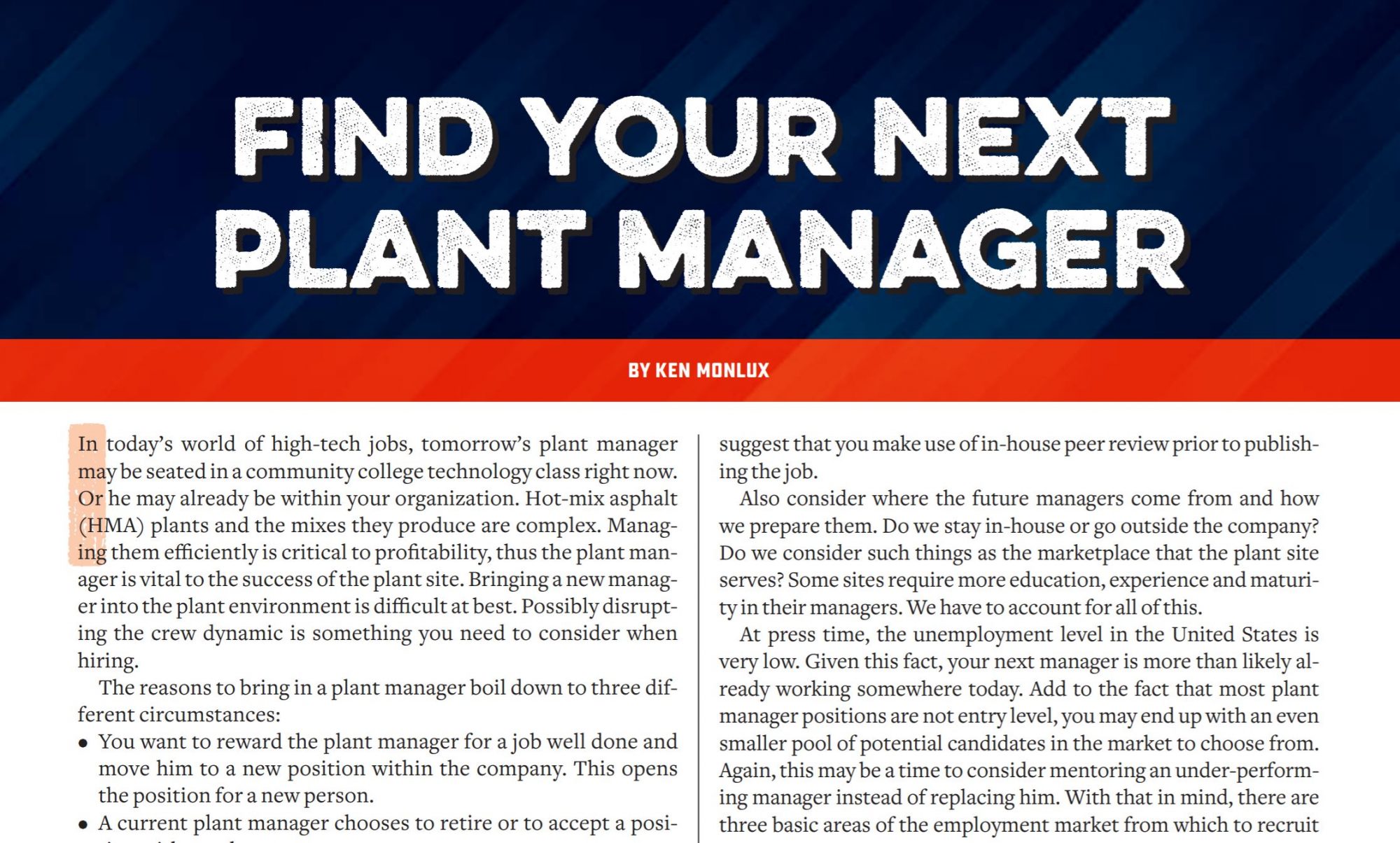How to Find Your Next Plant Manager
BY Ken Monlux

In today’s world of high-tech jobs, tomorrow’s plant manager may be seated in a community college technology class right now. Or he may already be within your organization. Hot-mix asphalt (HMA) plants and the mixes they produce are complex. Managing them efficiently is critical to profitability, thus the plant manager is vital to the success of the plant site. Bringing a new manager into the plant environment is difficult at best. Possibly disrupting the crew dynamic is something you need to consider when hiring.
The reasons to bring in a plant manager boil down to three different circumstances:
- You want to reward the plant manager for a job well done and move him to a new position within the company. This opens the position for a new person.
- A current plant manager chooses to retire or to accept a position with another company.
- A current plant manager is underperforming in the position to a point that upper management feels the need to change personnel. This is a difficult decision that will have a detrimental effect on all aspects of the plant, including the short-term operation and costs involved in recruiting and selecting a replacement.
Look at the third circumstance more closely. An alternative to replacing an underperforming plant manager is to provide additional training and oversight with the goal to rehabilitate. This line of thinking can improve the overall morale of the site and the manager in question. More often than not, this is more cost effective than replacing the manager.
An essential component of a rehabilitation program is the use of mentors. A mentor can work with the manager in question, in a structured manner, to effect the needed changes in performance. In this way, the plant site does not suffer from the disruption in managerial flow.
Generally, a plant manager’s duration is 10 years or more.
Recruitment Skills to Find an Asphalt Plant Manager
With all that said, there will come a day when, for whatever reason, you will need to find a new plant manager.
Every plant site offers similar challenges to its management. Such things as sales volume, age of the plant, and degree of sophistication of mixes are a few you may consider mentioning in an ad for the position. Working with the human resources department, you can decide if you develop a location-specific job description, or if you use a general description for all managers at this level.
However you end up describing the position, I would suggest that you make use of in-house peer review prior to publishing the job.
Also consider where the future managers come from and how we prepare them. Do we stay in-house or go outside the company? Do we consider such things as the marketplace that the plant site serves? Some sites require more education, experience and maturity in their managers. We have to account for all of this.
At press time, the unemployment level in the United States is very low. Given this fact, your next manager is more than likely already working somewhere today. Add to the fact that most plant manager positions are not entry level, you may end up with an even smaller pool of potential candidates in the market to choose from. Again, this may be a time to consider mentoring an under-performing manager instead of replacing him. With that in mind, there are three basic areas of the employment market from which to recruit a new manager.
- You could attract a manager from your competitor, but you need to consider why the employee is available. Do you end up bringing your competition’s “problem” to your site? If you recruit a competitor’s employee from out-of-area, you end up with additional costs.
- You could “poach” from your own crew, but you need to consider whether you take a good operator and make him a poor manager. Even if he makes a great manager, you create a void on the crew with this decision.
- You could recruit and train a person from a school or from another industry, which is another topic for another day.
No matter where you concentrate your efforts in finding the new manager, the first thing to know is the style (background) of the ideal manager you’re looking for. If you were to survey the plant managers across North America, you’ll find a few different categories. Each of these categories has benefits and drawbacks.
- Plant operator/manager: The focus of this type of manager is to physically operate the plant. This type of manager would be stationed in the control room. In addition, this manager will give direction to the crew, load out finished product and be the point of contact at the site. This is a very popular form of management. At a first examination, this seems to be a natural partnership. This form of management may work well for many sites.
- Repair lead/manager: The focus of this manager is to ensure the plant is operational. This manager would be on the ground inspecting the plant, looking for repair issues. In addition, this form of manager will give direction to the crew, and order needed repair parts and supplies. This choice works well at the portable plant site that will move to various locations throughout the year.
- Sales-service/manager: The focus of this manager is the customer. This manager would be responsible for the scheduling, crew and outgoing truck flow of the plant. This manager is on the road and/or stationed in the lab site at the plant. This manager will be customer- or jobsite-oriented and may work well for a remote site that has a high percentage of outside commercial work.
- Fulltime plant manager: The focus of this manager would be the business portion of the operation. This fulltime manager oversees all phases (labor, materials and production) of the operation, with an eye towards managing costs. This manager is best suited for large volume production sites. The fulltime manager in this type of setting not only has a production crew, but also has additional support staff in need of further oversite.
You need to decide what your ideal candidate looks like. I would suggest making an in-house wish list of all the prerequisites you would like to see in a plant manager. This is an internal document that goes beyond what you would advertise; it is only an exercise in development. Let your mind work outside the box to best describe your wants and needs. Remember, the better you can describe the ideal candidate, the more successful you will be in recruitment.
Before we can start the recruiting process, we should take a critical look at the job itself.
Consider what your company has to offer the candidates. You should consider not only what you’re looking for in a manager, but also your expectations for the position and for the individual. If you want the candidate to be content in the position for the long term, then you’re not looking for someone who has the obvious ability to move up within the company. Are you looking for a short-term fix, or are you looking to fill the position for the long term?
Some of the prerequisites you should be looking for include:
- Education or training
- Ability to work within the environment of the plant site, and its non-traditional schedule
- Recommendations
- Experience
- General health
- Personal traits
Prior to listing the ad, have you considered the current crew? Your job offer needs to consider the character of the coherent team that is already in place. A typical plant crew consists of three to four members working long hours in tough conditions. The crew needs to work closely together as a unit. Sometimes in an effort to fill a position, we are willing to toss a new manager into the fold without consideration for the group as a whole. Too many times, a new manager is placed in a position that is destined for disaster.
Once we have identified the traits we would like to see in our candidate, we publish the offer for employment.
Choose An Asphalt Plant Manager Wisely, Train Properly
The selection phase is a function of successful planning, and published description of the qualifications of the job. By making known what you think is an ideal candidate, you are able to narrow down the selection.
The interview is vital to the selection phase. Prior to any successful interview, take some time to develop questions and an outline of areas to cover.
When you have the ideal fit and the candidate has accepted your offer, training must come next.
Even if your ideal candidate has had previous plant operating experience, he might not have experience operating plants in your company culture. You can’t hand him a map to the plant location and send him on his way. That is exactly what happened to me early in my career. On the first day, within the first hour, as I was being introduced to the main office staff, the phone rang. At that point, I was told, “the plant is down, so take this map and get to the site.”
The integration of the new manager must be as thought-out as the recruitment phase. By providing a few simple steps, you can get your new employee up to speed efficiently and safely.
Some steps to consider: Most companies have new employee orientation guidelines. If your company does not, you will want to implement an orientation program with your human resources manager. Someone must provide safety training in addition to company policy review.
Make sure you provide a time frame to allow the new manager to shadow a current manager or a regional manager. Use your company’s policy to get feedback on the new hire and to groom the new hire to be successful.
The position of plant manager is too critical to your successful plant operation to let any of these steps go unplanned. It is a position that varies depending on the operational and marketing factors unique to each plant. In the process of recruiting a new manager, develop a plan that will best reflect the needs of the plant site. Execute the plan to attract the best candidate and then take the time to integrate the new employee to the position. Remember, the purpose of this process is to provide a long-term employee that will be an asset to the company.

Ken Monlux
Ken Monlux is an asphalt industry veteran with 30 years experience in all areas of operational management. For more information, contact him at (209) 495-1017 or kenmonlux@yahoo.com.
